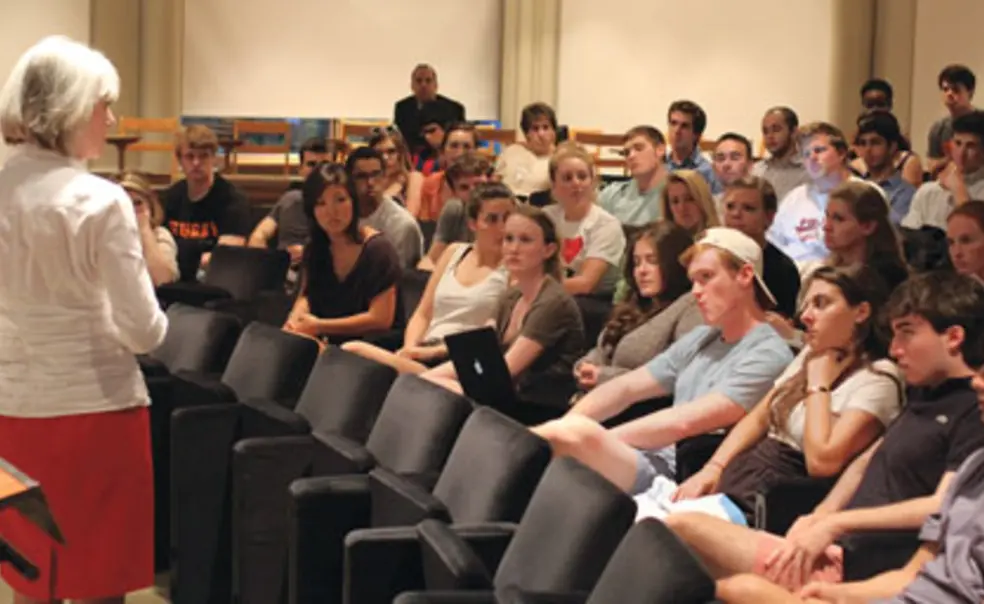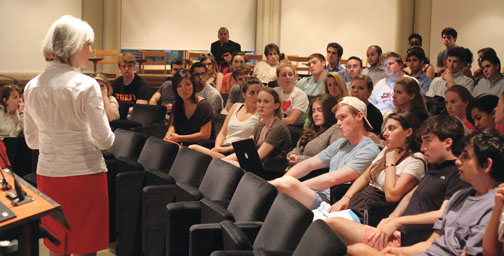Study group: Ban freshmen from Greek organizations
The report, which was presented at a meeting of the Council of the Princeton University Community, was commissioned last fall by President Tilghman. The working group’s two leaders, Durkee and Vice President for Campus Life Cynthia Cherrey, set forth a number of recommendations for improving the undergraduate experience, including the reintroduction of a campus pub. But it was the proposal to restrict membership in Greek organizations, which exist widely on campus although they are not officially recognized by the University, that drew the most criticism. Several dozen fraternity and sorority members attended.
The report expressed concern about several features of what Durkee characterized as the current “faux Greek” system. Because fraternities and sororities conduct rush early in freshman year, and sometimes begin recruiting students even before they arrive on campus, they push freshmen to “narrow their social circles long before they have an opportunity to meet a wide range of students and gain full exposure to all that Princeton has to offer,” the report said. The report also stated that fraternities and sororities tend to draw a racially and economically homogeneous group of members.
A greater concern, however, is that fraternities and sororities have been associated with dangerous and demeaning hazing rituals and “irresponsible, excessive, dangerous, and in some cases, coerced” alcohol consumption, the report said.
Although the report acknowledged that many Greek organizations have become feeders for particular eating clubs, it recommended only that students be prohibited from affiliating with them during freshman year. “The penalty for violating these prohibitions,” the report stated, “should be severe enough to encourage widespread compliance, which probably means a minimum penalty of suspension.” The University should continue its policy of not recognizing Greek organizations, the report said, and should step up its efforts to challenge national fraternity and sorority organizations to remove Princeton’s name from their websites and to stop suggesting that they have official chapters on campus.
In addition to the ban on freshman membership, the report recommended that the University impose “highly consequential disciplinary penalties” on students found to have practiced any form of hazing that endangered another student’s health or well-being.
Durkee said he hoped that the recommendations could be put into effect in time for the start of the 2011–12 academic year.
Although Princeton was home to some of the earliest fraternity chapters, membership in Greek organizations was prohibited under threat of expulsion from the mid-19th century until World War II. Fraternities and sororities began to reappear on campus in the early 1980s. Since 2004, the University has sent a letter to all incoming freshmen urging them not to join, but those admonitions have been ignored widely. There are believed to be as many as a dozen fraternities and three sororities at Princeton, and it is estimated that they draw up to 15 percent of the undergraduate student body.
During a question period at the end of Durkee’s presentation, several students challenged the data upon which the report was based; others insisted that problems with alcohol abuse and hazing were either overblown or already have been addressed. While students acknowledged that many Greek organizations serve as “feeders” to the eating clubs, they noted that many other campus groups do the same.
The difference, Durkee responded, is that while membership in a particular eating club might be a peripheral benefit of joining, for example, a singing group or dance troupe, it usually is not the principal reason for joining. Several students in the audience shook their heads or spoke out in disagreement.
Some students questioned how the University would enforce a prohibition on freshman membership, and one asked if the University was prepared to issue mass suspensions in case of widespread disobedience. “I certainly hope we’re not going to have a lot of students violate the rule,” Durkee replied.
After the meeting, several fraternity and sorority members continued to speak out. Kara Dreher ’12, president of Kappa Alpha Theta, wrote in an e-mail that a freshman ban would harm women who get support for taking leadership positions on campus from sorority sisters. “A lot of students feel that banning freshmen is just one step in what would ultimately be the dissolution of all fraternities,” said Austin Harris ’13, a member of Chi Phi and Terrace Club.
Eric Hagstrom ’13, a member of Phi Kappa Sigma, suggested that by funneling Greek membership into the fall of sophomore year, a freshman ban might make it more likely that fraternities and sororities would become feeders to the clubs.
Jake Nebel ’13, a member of Alpha Epsilon Pi, wrote a public letter to President Tilghman opposing the ban; the letter received more than 700 signatures in a week.
At a May 11 forum, Cherrey and Durkee listened as students vehemently disagreed with many of the report’s conclusions. But even as some students shook their heads in frustration, most seemed eager to engage in a conversation with the University, with many students supporting a compromise that would push rush back to spring semester of freshman year.
Students highlighted the mentorship benefits of sororities and fraternities and said Greek life offered the kind of informal, “unstructured” socializing between classes that Durkee said the working group wanted to encourage.
The Greek system’s lack of diversity was also discussed. Durkee said that 67 percent of students in fraternities and sororities do not apply for financial aid, compared to 37 percent of the overall student body. Students countered that every fraternity and sorority on campus offered a financial-aid program, providing scholarships and sometimes waiving dues.













No responses yet